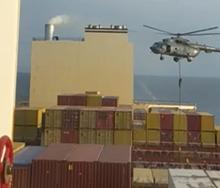Business risk advisory firm Aon has compiled a list of ten global risks that continue to threaten logistics and supply chain service providers in the aftermath of disruption stemming from the Covid-19 pandemic and ongoing international trade impediments.
According to its ‘Global Risk Management Survey’, data breaches and cyber attacks top the list of potential threats to business security, followed by economic slowdown or slow recovery from disruption.
The remaining threats highlighted by the survey are business interruption, increasing competition, workforce shortages, supply chain or distribution failure, regulator or legislative changes, the failure to attract or retain staff with a proven skill set, property damage and innovation failure, especially insofar as changing customer needs are concerned.
But the situation is up close and further afield and deserves more scrutiny, says Russell Davis, property manager at Aon South Africa.
“Variations in the risks in the top rankings are driven by more immediate and pressing concerns of other risk factors within the region.
“For example, both business interruption and supply chain and distribution failure rank higher for South Africa, very likely driven by the Transnet crisis and the state of our ports, railway and roads infrastructure, and the dramatic impact this is having on supply chains.”
An example of the deterioration of the domestic freight network is the state of infrastructure that supports trucking and logistics in many places, says Davis.
“Political risk also ranks at #9, whereas it does not currently feature in the global top 10 – driven by the fact that it is an election year in South Africa with an increasingly uncertain and volatile environment.
“Each of these top 10 risks has tremendous significance for the transport and logistics industry, particularly given the ripple effect they have in a market environment where risks are increasingly interconnected and complex.”
Unpacking the top five risks for South Africa’s transport and logistics industry, Davis says: “Business interruption is intrinsically linked to many other top 10 risks and is now more systemic, partially because of global business operations companies shifting from event-based to impact-based risk assessment.
“Business interruption can affect multiple industries, regions, trade paths and companies simultaneously as they phase in and out of periods of recovery.”
As for economic slowdown and slow recovery, he says while higher commodity prices are good for exporting countries such as South Africa, Transnet’s underperformance has impacted commodity exports and other sectors such as manufacturing and retail, weakening Africa's most advanced economy.
“The country is also faced with rapid inflation in the form of rising food and energy prices in addition to natural disasters such as record-breaking rainfall, drought and increased fire risk.
“Some of the side effects of an economic slowdown include a slowing or disruption of revenue streams, supply chain disruptions and financing issues, which could potentially lead to labour retrenchments in a bid to manage costs, further hampering the efficiency of the transportation and logistics sector.
“The industry also finds itself in a globalised environment where international competitors can step in and reduce the size of the pie even further.”
Third on the list of top-five risks threatening local business is exchange rate fluctuations, Davis points out.
“The weakened rand lends itself more towards an export-driven market than an import market, which effectively turns an industry that is governed by imports and exports as a business principle into a volatile rollercoaster ride.”
Going into supply chain or distribution failure, he says the definition of supply chain risk is broadening and becoming more complex, extending well beyond keeping shipping vessels moving or suppliers’ manufacturing facilities intact.
“Today it involves the availability of talent, the ongoing solvency of critical suppliers, the ESG performance of a company’s supply chain, and the increased IP and cyber exposure triggered by shared supplier systems and processes.
“By its nature, the (freight) sector participates in complex, extended supply chains, which means there are many possible points of failure. Consider the rise in cargo theft, which is at a 10-year high. Social media and advanced technologies have made it easier for bad actors to spot and seize opportunities, including impersonating drivers, hijacking, and conducting fraudulent cargo pickups.
Lastly, logistics and supply chain companies must consider the threat of commodity price risks and materials scarcity.
Says Davis: “In the context of the transport and logistics industry, markets and supply chains have increasingly become global in nature, but disruptions in specific regions can have a pronounced effect on prices and supply. For example, in September 2023, global oil prices hit a 10-month high, spurred by falling shale oil production in the US and a decrease in production by Saudi Arabia and Russia.
“The impact of rising oil prices reverberates across nearly every industry due to the commodity’s many uses. Oil is a critical component in many parts of the modern economy, notably transportation and, despite the focus on the energy transition, oil and its attendant price fluctuations will continue to be a factor in strategic planning for decades to come.”
According to Davis the cargo sector will need to continue to develop new strategies to address the fast-evolving risks that are on its doorstep as well as any new risks that are approaching.
“Resilience and significant value are at stake. Having to pivot and constantly make high-impact decisions around protecting the company’s people and assets, its balance sheet, revenue, costs and business strategy is no small feat.”
Consequently, Davis recommends three vital lessons:
- Decision-making must be driven by continually refreshing a business’s understanding of what is known today and then using that knowledge to recalibrate its understanding of how tomorrow is being reshaped.
- Leaders must have the right mindset, the most relevant data and information at their fingertips and a robust decision-making framework in place to manage a great deal of uncertainty.
- While no one can predict the future, making the best decision hinges heavily on having the right information available to inform the decision-making process to navigate towards a better future with clarity and purpose.
He says: “Embracing a problem-solving approach in decision-making will help organisations find solutions for the risks and crises it is faced with as these risks unfold.
“While many of these events cannot be insured directly, the value of having an expert risk adviser in your corner who can provide data and analytical insights from a global and local perspective will create a clearer picture of emerging technologies, trends and risk-management approaches to help organisations make better risk decisions.”













